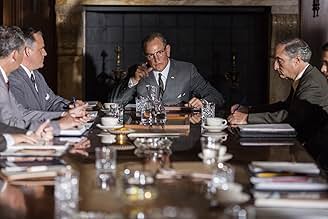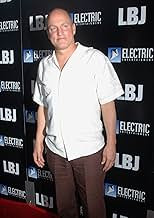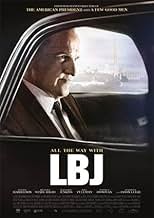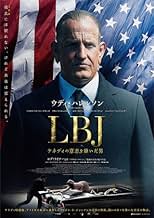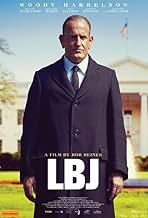AVALIAÇÃO DA IMDb
6,5/10
8,1 mil
SUA AVALIAÇÃO
Lyndon B. Johnson alia-se a John F. Kennedy, ascende à presidência e lida com as lutas pelos direitos civis dos anos 60.Lyndon B. Johnson alia-se a John F. Kennedy, ascende à presidência e lida com as lutas pelos direitos civis dos anos 60.Lyndon B. Johnson alia-se a John F. Kennedy, ascende à presidência e lida com as lutas pelos direitos civis dos anos 60.
- Prêmios
- 1 indicação no total
Michael Francis Horn
- Cliff Carter
- (as Michael Horn)
Avaliações em destaque
The movie starts with LBJ (Woody Harrelson) and wife Lady Bird (Jennifer Jason Leigh) waiting for the arrival of President Kennedy (Jeffrey Donovan) at the Dallas airport in 1963 with rival liberal Texas Senator Yarborough (Bill Pullman). In flashbacks, he promises Bobby Kennedy (Michael Stahl-David) not to run for President. He is asked to join the ticket by JFK over Bobby's object. As VP, he cajoles leading southern Democrat Senator Richard Russell (Richard Jenkins). The second half follows the JFK assassination.
There is superb acting from Harrelson in a character study of the President from director Rob Reiner. There are some glaring physical drawbacks. First thing I noticed is that Harrelson is not quite the towering presence that the President was in real life. There is a real need to have that hulking sense on the screen. It's partly his physical presence that contributes to his power. In the same vein, Jeffrey Donovan doesn't have the pretty boy face of JFK especially if the movie keep harping on that fact. It wouldn't matter if those two Presidents aren't so defined by those characteristics. What gives the movie its power comes from LBJ calling, cajoling, and negotiating with the political world. It is more problematic to try to climax with his speech which is not his biggest strength. The climax should be the passing of the civil rights bill. Instead, it is covered in the closing text. Overall, Harrelson does an admirable job despite his physical dissimilarities. Outstanding support comes from Richard Jenkins. It's a solid biopic.
There is superb acting from Harrelson in a character study of the President from director Rob Reiner. There are some glaring physical drawbacks. First thing I noticed is that Harrelson is not quite the towering presence that the President was in real life. There is a real need to have that hulking sense on the screen. It's partly his physical presence that contributes to his power. In the same vein, Jeffrey Donovan doesn't have the pretty boy face of JFK especially if the movie keep harping on that fact. It wouldn't matter if those two Presidents aren't so defined by those characteristics. What gives the movie its power comes from LBJ calling, cajoling, and negotiating with the political world. It is more problematic to try to climax with his speech which is not his biggest strength. The climax should be the passing of the civil rights bill. Instead, it is covered in the closing text. Overall, Harrelson does an admirable job despite his physical dissimilarities. Outstanding support comes from Richard Jenkins. It's a solid biopic.
I was 10 when LBJ became president. I associated him more with possibly putting me in Vietnam than anything else. It wasn't a good impression. This movie and Harrelson's excellent portrayal fleshes out the man as someone who had mastered the art of political give and take, who was as powerful a senator as you could become, and yet someone who needed people's approval and even love. If you expect to see LBJ the great manipulator and master politician, you'll only get a little of that. More, you'll get exposed to LBJ's complex relationships with his wife Lady Bird, John and Bobby Kennedy, Kennedy's presidential staff, and one or two congressmen such as Senator Russell of Georgia. Set against a huge backdrop, this is still an intimate movie of LBJ the man. My wife and I both enjoyed it.
Few things are as comfortable as a Rob Reiner film. The director who is still commonly referred to lovingly as Meathead by fans of the iconic All in the Family television series has been directing films since the early 80's and his films are consistently entertaining inoffensive fair marketed to mass audiences. The Princess Bride, A Few Good Men, The American President and The Bucket List are just a sampling of the director's filmography that audiences will be familiar.
Those that watch Rob Reiner on the talk show circuit would know that the outside of being an actor and director, he is very political activist who uses his celebrity status to bring attention to equal rights and to social issues such as violence and tobacco use.
So it is a bit of surprise that Rob Reiner has never made a film that might leverage his strong activist lifestyle. Until now, that is.
LBJ is Rob Reiner's film about the 36th President of the United States, Lyndon B. Johnson, who was thrust from the Vice-President's chair to the Oval Office desk after the assassination of John Fitzgerald Kennedy on that fateful November day in 1963.
Woody Harrelson plays LBJ and the film takes us backwards and forwards in time from LBJ's unsuccessful run for the Democratic Party nomination through JFK's assassination and ultimately through the President's fight for an Equal Rights Bill.
The heart of the film comes from LBJ's battle within his own party. Robert Kennedy (Michael Stahl-David) is hardly a fan of the foul-mouthed Texan who was hand-picked by brother John for the Vice-President position. The two will battle wills and disagree on almost all political talking points throughout their tenures. Also providing resistance to LBJ's forward thinking is Senator Richard Russell (Richard Jenkins) from the state of Georgia. Russell is portrayed as a racist that does not believe that individuals of color deserve the same rights and freedoms as all other Americans. LBJ does his best to try and win the trust of Russell and LBJ walks the thin line of keeping Russell in the fold before he abandons his friendship with the Senator in his attempt to fulfill the inroads JFK had made in his equal rights efforts prior to his assassination.
Harrelson is barely recognizable as the title character. The make-up is thick to ensure he resembles the former President. At times, the make-up is brilliant. The big ears and receding hairline of LBJ is captured expertly. But at other times – particularly in close-ups – the make-up looks like Harrelson was an extra in Warren Beatty's Dick Tracy film.
LBJ is obviously the focus, but there is ample time given to JFK. And the assassination in Texas is captured with valuable attention to detail. The assassination is a key point in the life of LBJ and Rob Reiner takes the time to film it correctly (it was filmed in Texas exactly where the shooting took place). Jeffrey Donovan (televisions Burn Notice) plays Kennedy and brings subtle touch to the role not attempting to overdo the Boston drawl.
As with all other Reiner films, LBJ plays it safe. Audiences may learn a few things about the complicated man along the way. His foul mouth, how he would have meetings while sitting on the toilet, and his insecurity always believing that he was not loved by either his inner circle or his country (he did win re-election by the widest margin in American history). To my embarrassment, I didn't know that LBJ was in a procession car with JFK the day he was killed. But LBJ is no Lincoln. Where the Spielberg film was brilliantly written and a character study of both a political family and the process to which they battled, LBJ skims the surface like a rock skipping along calmer waters. Gritty, LBJ is not.
But safe entertainment can still be good entertainment and Reiner is surely a master at that craft. There is plenty of humor in the film to keep the characters interesting and keeping the story non-linear works to valued effect. LBJ will not be considered Rob Reiner's best work, but it is exactly what you can come to expect from the director. And slipping into a comfortable shoe can be so so comfortable.
Those that watch Rob Reiner on the talk show circuit would know that the outside of being an actor and director, he is very political activist who uses his celebrity status to bring attention to equal rights and to social issues such as violence and tobacco use.
So it is a bit of surprise that Rob Reiner has never made a film that might leverage his strong activist lifestyle. Until now, that is.
LBJ is Rob Reiner's film about the 36th President of the United States, Lyndon B. Johnson, who was thrust from the Vice-President's chair to the Oval Office desk after the assassination of John Fitzgerald Kennedy on that fateful November day in 1963.
Woody Harrelson plays LBJ and the film takes us backwards and forwards in time from LBJ's unsuccessful run for the Democratic Party nomination through JFK's assassination and ultimately through the President's fight for an Equal Rights Bill.
The heart of the film comes from LBJ's battle within his own party. Robert Kennedy (Michael Stahl-David) is hardly a fan of the foul-mouthed Texan who was hand-picked by brother John for the Vice-President position. The two will battle wills and disagree on almost all political talking points throughout their tenures. Also providing resistance to LBJ's forward thinking is Senator Richard Russell (Richard Jenkins) from the state of Georgia. Russell is portrayed as a racist that does not believe that individuals of color deserve the same rights and freedoms as all other Americans. LBJ does his best to try and win the trust of Russell and LBJ walks the thin line of keeping Russell in the fold before he abandons his friendship with the Senator in his attempt to fulfill the inroads JFK had made in his equal rights efforts prior to his assassination.
Harrelson is barely recognizable as the title character. The make-up is thick to ensure he resembles the former President. At times, the make-up is brilliant. The big ears and receding hairline of LBJ is captured expertly. But at other times – particularly in close-ups – the make-up looks like Harrelson was an extra in Warren Beatty's Dick Tracy film.
LBJ is obviously the focus, but there is ample time given to JFK. And the assassination in Texas is captured with valuable attention to detail. The assassination is a key point in the life of LBJ and Rob Reiner takes the time to film it correctly (it was filmed in Texas exactly where the shooting took place). Jeffrey Donovan (televisions Burn Notice) plays Kennedy and brings subtle touch to the role not attempting to overdo the Boston drawl.
As with all other Reiner films, LBJ plays it safe. Audiences may learn a few things about the complicated man along the way. His foul mouth, how he would have meetings while sitting on the toilet, and his insecurity always believing that he was not loved by either his inner circle or his country (he did win re-election by the widest margin in American history). To my embarrassment, I didn't know that LBJ was in a procession car with JFK the day he was killed. But LBJ is no Lincoln. Where the Spielberg film was brilliantly written and a character study of both a political family and the process to which they battled, LBJ skims the surface like a rock skipping along calmer waters. Gritty, LBJ is not.
But safe entertainment can still be good entertainment and Reiner is surely a master at that craft. There is plenty of humor in the film to keep the characters interesting and keeping the story non-linear works to valued effect. LBJ will not be considered Rob Reiner's best work, but it is exactly what you can come to expect from the director. And slipping into a comfortable shoe can be so so comfortable.
Greetings again from the darkness. More than 50 years after his death, President John Kennedy casts an ever-present shadow over Lyndon Baines Johnson's career as a stellar politician and a President with significant accomplishments. Part of the reason is presentation – JFK was a story book leader straight from the fashion magazines, while LBJ was a vulgar-at-times comic book adversary who looked and talked funny. Each has been portrayed on film numerous times and from various perspectives.
Woody Harrelson and his facial prosthetics play LBJ, and Mr. Harrelson seems to be enjoying the swagger and emotional range of the titular man. What this film does that's a bit different from others is embrace the comedic elements – enhanced by both the performance and the script from Joey Hartstone. It seems odd (a somewhat awkward) to have so many laughs in a movie where the infamous 1963 Presidential motorcade, and subsequent assassination, form the backdrop.
Director Rob Reiner presents LBJ in all his crude and gruff glory, but also shows the ultimate politician – a man who was constantly negotiating. Intimidation was always part of the LBJ motif, and the film effectively displays the tactics used by John and Bobby Kennedy (Jeffrey Donovan, Michael Stahl-David) to take the wind out of LBJ's sails after the election.
There are reenactments throughout the film that place us back in the middle of iconic images seared into our memories the motorcade after the shots, the scene at Parkland, and the swearing in aboard Air Force One with Jackie still wearing her blood-stained Chanel suit. This was an incredible time in our history, as the nation was emotionally shattered. It's for this reason that much of the film seems disjointed or misguided. Too much (or maybe not enough) attention is on LBJ's strained relationship with Georgia Senator Richard Russell (Richard Jenkins), one of the most racist men we've seen on screen. Their discussion of race relations while being served dinner by the black woman is beyond uncomfortable – yet still somehow too stagey.
Most of the film is spent on LBJ's time as Senator and Vice President, with only the final act being about his famous networking upon ascending to the Presidency after which the entire focus is on the Civil Rights Act. The flow of the film seems a bit off, though most will enjoy watching Harrelson's performance – especially when paired with Jennifer Jason Leigh's Lady Bird. Together, the two almost rescue the script.
Woody Harrelson and his facial prosthetics play LBJ, and Mr. Harrelson seems to be enjoying the swagger and emotional range of the titular man. What this film does that's a bit different from others is embrace the comedic elements – enhanced by both the performance and the script from Joey Hartstone. It seems odd (a somewhat awkward) to have so many laughs in a movie where the infamous 1963 Presidential motorcade, and subsequent assassination, form the backdrop.
Director Rob Reiner presents LBJ in all his crude and gruff glory, but also shows the ultimate politician – a man who was constantly negotiating. Intimidation was always part of the LBJ motif, and the film effectively displays the tactics used by John and Bobby Kennedy (Jeffrey Donovan, Michael Stahl-David) to take the wind out of LBJ's sails after the election.
There are reenactments throughout the film that place us back in the middle of iconic images seared into our memories the motorcade after the shots, the scene at Parkland, and the swearing in aboard Air Force One with Jackie still wearing her blood-stained Chanel suit. This was an incredible time in our history, as the nation was emotionally shattered. It's for this reason that much of the film seems disjointed or misguided. Too much (or maybe not enough) attention is on LBJ's strained relationship with Georgia Senator Richard Russell (Richard Jenkins), one of the most racist men we've seen on screen. Their discussion of race relations while being served dinner by the black woman is beyond uncomfortable – yet still somehow too stagey.
Most of the film is spent on LBJ's time as Senator and Vice President, with only the final act being about his famous networking upon ascending to the Presidency after which the entire focus is on the Civil Rights Act. The flow of the film seems a bit off, though most will enjoy watching Harrelson's performance – especially when paired with Jennifer Jason Leigh's Lady Bird. Together, the two almost rescue the script.
After having its world premiere at the Toronto International Film Festival in September 2016, Rob Reiner's LBJ has finally bowed out in theatres over one year later. Woody Harrelson does a pretty good job as the title character and uses his natural Texan features well. The rest of the supporting cast doesn't shine as brightly, and a rehashed story about the Civil Rights Movement makes this film average at best.
The film follows the years 1959-1963, a time when Johnson was at the height of his power. We follow his path from Senate majority leader, vice president, and ultimately, president. Along on the ride is his ever supporting wife, Lady Bird Johnson (Jennifer Jason Leigh). Lyndon also has to deal with the civil rights policies of JFK (Jeffrey Donovan) and how he is going to carry that legacy after the infamous assassination in Dallas.
The film only carries a 98-minute runtime and flows at a speedy pace. The only event we really spend that much time on is the civil rights debate. The Civil Rights Act of 1964 is the final act of the film and we never see anything else about Johnson's presidency. It doesn't feel right that a film titled LBJ only concentrates on less than half his term. The film also feels like it was made in the 90's because of the overly patriotic tone and score. I feel that releasing this film as a television movie would have been a better film because of the small size and focused storyline.
LBJ is also a slightly comedic film mostly because of the overly vulgar and blunt antics by Johnson himself. People that have lived through his administration will probably get most of the jokes and find the comedy in serious situations. The best moment comes in the beginning of the film when Johnson is heckling his workers and calling his tailor to resize his pants because of his "well endowment" and need for his "nuts to breathe".
The biggest disappointment of the film is the makeup. While it's usually not a huge component, in this instance it really throws off the look of the actors. Woody Harrelson in full makeup doesn't look that much like the real Johnson. A side by side comparison of the two will really puts the poor makeup in perspective. Jennifer Jason Leigh's transformation into Lady Bird Johnson ends up being even worse than Harrelson's. You can obviously see the makeup on her face and it doesn't look natural. It looks like she has a Halloween mask on her face.
The acting is either hit or miss, with some performances ranging from pretty good to downright bad. Woody Harrelson does a decent job as Johnson. He has the same gravitas and powerful demeanor Johnson had in real life. However, Harrelson doesn't have a convincing southern accent even though he spends about half his time talking about the south. His performance also pales in comparison to Bryan Cranston's role in the 2016 television film All the Way.
Jeffrey Donovan does a great job as John F. Kennedy. He perfectly imitates Kennedy's famous voice and shares many physical similarities with him. He plays Kennedy as a calm and collected politician that never cracked under pressure, especially when it came to civil rights. Michael Stahl-David does an equally great job as the Robert Kennedy. RFK is the opposite of his president brother since he is headstrong and not afraid to voice his unwanted opinion. He constantly butts heads with Johnson and they continue their rivalry throughout the whole film.
Jennifer Jason Leigh does a poor job trying to portray the famous first lady. She never delivers more than a couple of lines of dialogue at a time and doesn't have a convincing southern accent. Lastly, Bill Pullman delivers a weird and unneeded performance as Senator Ralph Yarborough. He only shows up for three scenes that total about less than ten minutes of screen time. He feels shoved in and I question why he's even in the film.
LBJ is a film that thought it was something special when it actually never lifts off the ground. Harrelson and Donovan are the only shining lights lackluster biopic that doesn't deliver on its promises. I recommend that viewers watch the superior All the Way if they want to learn about Johnson's involvement with the Civil Rights Movement.
The film follows the years 1959-1963, a time when Johnson was at the height of his power. We follow his path from Senate majority leader, vice president, and ultimately, president. Along on the ride is his ever supporting wife, Lady Bird Johnson (Jennifer Jason Leigh). Lyndon also has to deal with the civil rights policies of JFK (Jeffrey Donovan) and how he is going to carry that legacy after the infamous assassination in Dallas.
The film only carries a 98-minute runtime and flows at a speedy pace. The only event we really spend that much time on is the civil rights debate. The Civil Rights Act of 1964 is the final act of the film and we never see anything else about Johnson's presidency. It doesn't feel right that a film titled LBJ only concentrates on less than half his term. The film also feels like it was made in the 90's because of the overly patriotic tone and score. I feel that releasing this film as a television movie would have been a better film because of the small size and focused storyline.
LBJ is also a slightly comedic film mostly because of the overly vulgar and blunt antics by Johnson himself. People that have lived through his administration will probably get most of the jokes and find the comedy in serious situations. The best moment comes in the beginning of the film when Johnson is heckling his workers and calling his tailor to resize his pants because of his "well endowment" and need for his "nuts to breathe".
The biggest disappointment of the film is the makeup. While it's usually not a huge component, in this instance it really throws off the look of the actors. Woody Harrelson in full makeup doesn't look that much like the real Johnson. A side by side comparison of the two will really puts the poor makeup in perspective. Jennifer Jason Leigh's transformation into Lady Bird Johnson ends up being even worse than Harrelson's. You can obviously see the makeup on her face and it doesn't look natural. It looks like she has a Halloween mask on her face.
The acting is either hit or miss, with some performances ranging from pretty good to downright bad. Woody Harrelson does a decent job as Johnson. He has the same gravitas and powerful demeanor Johnson had in real life. However, Harrelson doesn't have a convincing southern accent even though he spends about half his time talking about the south. His performance also pales in comparison to Bryan Cranston's role in the 2016 television film All the Way.
Jeffrey Donovan does a great job as John F. Kennedy. He perfectly imitates Kennedy's famous voice and shares many physical similarities with him. He plays Kennedy as a calm and collected politician that never cracked under pressure, especially when it came to civil rights. Michael Stahl-David does an equally great job as the Robert Kennedy. RFK is the opposite of his president brother since he is headstrong and not afraid to voice his unwanted opinion. He constantly butts heads with Johnson and they continue their rivalry throughout the whole film.
Jennifer Jason Leigh does a poor job trying to portray the famous first lady. She never delivers more than a couple of lines of dialogue at a time and doesn't have a convincing southern accent. Lastly, Bill Pullman delivers a weird and unneeded performance as Senator Ralph Yarborough. He only shows up for three scenes that total about less than ten minutes of screen time. He feels shoved in and I question why he's even in the film.
LBJ is a film that thought it was something special when it actually never lifts off the ground. Harrelson and Donovan are the only shining lights lackluster biopic that doesn't deliver on its promises. I recommend that viewers watch the superior All the Way if they want to learn about Johnson's involvement with the Civil Rights Movement.
Você sabia?
- CuriosidadesWoody Harrelson's late father Charles Harrelson was a Texas hitman who had famously claimed to have killed President Kennedy (he was sentenced to life in prison for murdering a Texas judge), but later admitted that he made up the story.
- Erros de gravaçãoHistorical quotes throughout the movie are edited to be more sensitive than the actual quotes were.
- Citações
Walter Jenkins: There's just no power in the vice presidency.
Lyndon B. Johnson: Walter, how long you been with me?
Walter Jenkins: 21 years.
Lyndon B. Johnson: And in 21 years, can you think of a time that I have taken over a new office, and not made it 100 times more powerful than when I got there?
Walter Jenkins: No, sir.
Lyndon B. Johnson: Power is where power goes.
- ConexõesReferenced in Midnight Screenings: Tulip Fever (2017)
- Trilhas sonorasSons of Thane
Written by John Knowles
Courtesy of APM Music
Principais escolhas
Faça login para avaliar e ver a lista de recomendações personalizadas
- How long is LBJ?Fornecido pela Alexa
Detalhes
- Data de lançamento
- País de origem
- Central de atendimento oficial
- Idioma
- Também conhecido como
- LBJ
- Locações de filme
- Empresas de produção
- Consulte mais créditos da empresa na IMDbPro
Bilheteria
- Orçamento
- US$ 26.000.000 (estimativa)
- Faturamento bruto nos EUA e Canadá
- US$ 2.470.979
- Fim de semana de estreia nos EUA e Canadá
- US$ 1.110.565
- 5 de nov. de 2017
- Faturamento bruto mundial
- US$ 2.510.151
Contribua para esta página
Sugerir uma alteração ou adicionar conteúdo ausente

Principal brecha
By what name was LBJ: A Esperança de uma Nação (2016) officially released in India in English?
Responda




